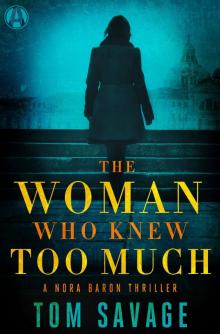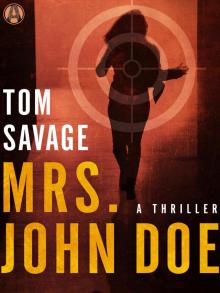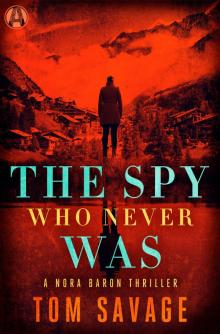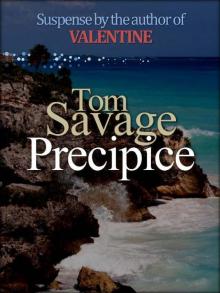- Home
- Tom Savage
Valentine Page 2
Valentine Read online
Page 2
A light flurry was adding itself to the carpet of snow on the ground as she emerged from the coffeehouse into the bustling, bright reality of Sheridan Square and made her way down Seventh Avenue toward home. She was thinking about dinner again. She had gone only a few steps when she slipped on a patch of ice and nearly lost her balance. She dropped her notebook, and she would have fallen had it not been for the hand that was suddenly there from behind, to steady her with a firm grip on her arm. She had a fleeting glimpse of a man’s black glove, and of the black sleeve of a leather coat. She leaned down to pick up the notebook and brush the snow from it, and by the time she turned around to thank her Samaritan he had hurried away.
Everyone was hurrying, she noticed, placing the notebook in her bag, which hung from her left shoulder. She was jostled several times by people rushing in and out of the subway entrance at Christopher Street. Others dashed to curbs, hailing cabs before the snow really started coming down and all the taxis magically disappeared. She smiled to herself as she looked around at the activity on the avenue. Not I, she thought. I live just around the corner, in the heart of the Village, and I work at home. I don’t have to worry about subways and taxis.
This had not always been the case, she remembered. Her relative freedom was a recent innovation. A New Yorker from birth, some of her earliest memories involved one form of urban transportation or another. Waiting at curbs in front of the Central Park West apartment building she grew up in, clutching her mother’s hand while her father—and, later, her stepfather—hailed a taxi. Shuttling to and from high school on the bus with two girlfriends.
When she’d returned to the city from college twelve years ago, her first job had been a nine-to-fiver at a famous publishing house here in Greenwich Village. She’d still been living with her mother, who was by then divorced and already beginning to display the first signs of her illness. So every day, for nearly four years, Jill had taken the Seventh Avenue line all the way down to Houston Street, a half-hour each way on the train, while she worked her way up from copyeditor to associate editor. She learned a great deal about publishing, not to mention men: her first real, adult affair was with a recently divorced senior editor. And every night for those four years, when she’d finished her publishing homework and gotten Mother to bed, she would sit at her computer in her tiny bedroom and write until nearly dawn. Her first three manuscripts were locked away in a drawer: she knew, instinctively, that they weren’t good enough to show anyone.
After four years with the first publishing company, she was wooed by another one in the midtown area with the promise of full editorship. She was not advancing anymore where she was, and her romance with the senior editor had cooled, so she accepted the offer. This had lasted three years, until she realized that editing other people’s books, though rewarding and often educational, was keeping her from her original dream of writing and publishing her own work. She handed in her notice, found suitable replacement editors in the company for her small but talented group of authors, and went home.
Her fourth attempt at a manuscript had been her first suspense story, Darkness. She wrote it in the few moments she had had to herself, when her brief, ill-fated relationship with a corporate tax lawyer wasn’t distracting her. She smiled now, remembering Ted and his proposal of marriage—a normal, safe existence. But she was nearly finished with the novel by then, and she knew in her heart that this thing she could do—writing—was essentially more important to her than anything else, certainly Ted. She knew, as only a creative artist can know, that Darkness would be accepted for publication, and she wasn’t the least surprised when it was published, and when it was successful. Because of Darkness, she would never again be dependent on public transportation.
And because of Mother, she thought, crossing Bleecker at the intersection and turning into Barrow Street, where she lived. She remembered the day three years ago, a few months after the publication of her first novel, when she had finally come to the realization that the doctors were right: Mother belonged in a nursing home, where she would receive the round-the-clock care and attention she obviously required. It had not been a pleasant decision, but at least the home—okay, hospital—in Port Jefferson, Long Island, had pretty green lawns and a view of Long Island Sound. That’s what Jill told herself, anyway, when she took her mother there and came back to town to see about selling the apartment on Central Park West where she’d lived her entire life. Saying good-bye to that place was easier than she’d anticipated: her mother was no longer there, after all, and it held too many unpleasant memories of her stepfather.
And then the move here, to the lovely corner of Barrow and Commerce, just in from Hudson Street. To a new setting for her new career, in another part of town. To her beautiful penthouse atop the seven-story corner building, with the tiny elevator and the north-facing picture window affording a view of the taller uptown buildings, and the side windows from which she could see the Hudson River three blocks west. From her east windows she looked down on the quiet, Y-shaped cul-de-sac itself, formed where the end of Commerce Street joined Barrow. The little Cherry Lane Theater was here, one of the oldest off-Broadway theaters still in operation. Across from it were the Twin Sisters, two identical little two-story houses, side by side, with the tiny communal garden between them. They were built by a ship’s captain years ago for his two daughters who, for reasons nobody really remembered, refused to speak to each other. Some business about a man, it was rumored, whom both sisters had loved, and who apparently ended up marrying neither of them. Even so, the two women had never forgiven each other, and they had lived out their whole lives there, next door to each other, in isolation and silence. Jill remembered staring at the two houses when she was first told their history, thinking how bizarre it was, and how oddly romantic. This little haven she now called home had been the site of deep passion, if lifelong sibling animosity could be regarded as such. . . .
The snow was falling more heavily as she crossed Bedford Street and came into her block. Everyone on the street had disappeared. The dark of the storm had intensified the natural dark of approaching evening, and the bitter chill of the wind blowing across Manhattan bit sharply into her face. She was alone here now, alone in the snow and the gathering twilight. She paused on the sidewalk in front of the Twin Sisters, rubbing her gloved hands briskly on her cheeks to soothe the numbness.
The sensation came upon her suddenly, and for a moment she wasn’t sure what it was. Something odd, different, about the way she was feeling. Something in the air around her. She stood on the comer, staring up at her own building on the other side of the snowy street, slowly lowering her hands from her face to her sides. It was on the back of her head, her neck, and between her shoulder blades. An intensity, a warmth that cut through the chill, tingling on her skin. She was acutely aware of her hair, her wool coat, the tug of the shoulder bag, her clothes, the soft snowflakes; everything that was touching her. And something else; something that was not touching her, but was there just the same. She closed her eyes against the panic that coursed through her. Then she took a deep breath, opened her eyes, and turned around.
There, on the far corner of Bedford, perhaps fifty yards away, stood the lone figure of a man. He was all in black, Jill noticed: jeans and stocking cap and leather coat and gloves. He was standing quite still, but through the snow she could not make him out clearly. He was tall, well over six feet, and slender. The cap covered his hair and much of his face, and just as she turned around, he turned his face away to glance up Bedford, as if he were looking for a particular address. After a moment’s hesitation, he walked off in that direction, disappearing from her view.
She stared at the now empty comer where he had been standing, then she looked swiftly around at all the other comers and stretches of sidewalk visible to her. She even scanned doorways and windows, looking into the front windows of the nearest Twin Sister behind her and over at the little restaurant on the ground floor of her own building. Nobody, anywhere.
r /> She shook her head absently and clutched her purse more tightly. What on earth? she thought. I could have sworn. . . .
No, she decided. It’s silly. But for a moment there, she was positive that someone had been watching her. She could still feel the lingering residue of an intense stare, aimed directly at the back of her head. Ridiculous: the only human being in sight had been that man, who was apparently looking for a building. . . .
Shaking her head again and smiling at her own fanciful imagination, Jill crossed the little street and walked up to her doorway next to the entrance to the restaurant. She got ready with the first of the two keys, just as Tara and Gwen and Mary and every other woman she knew did. Self-defense classes: an unfortunate by-product of being female and living in the city. Of being female and living on this planet, she thought ruefully as she opened the unlocked outer door, peering through the glass first to make sure there was no sinister male form lurking in the shadows inside. She’d actually joined the class with her friends as research for her third novel, because the policewoman in the story had to get physical a couple of times. Now, Jill was grateful for the training, however rudimentary.
She was just about to unlock the inner door when she remembered the mailbox. She glanced over at the shiny row of brass-fronted compartments next to the intercom, debating. Mail usually meant bills, and she only checked the box every other day or so. But Mary, her agent, had said something on the phone this morning about a new paperback contract for The Mind of Alice Lanyon. A larger advance, which was nice. The amazing amount of money people were willing to pay her for writing always thrilled her. She was very comfortable now, as her accountant and her broker and Mary Daley were quick to remind her. God bless the Times bestseller list, she thought, switching from the door key to the tiny one for the mailbox. And God bless the reading public in twelve—thirteen?—countries.
The contract was there, in a large manila envelope with the agency’s logo on the sticker above her name and address. The contract, and something else: a square, pink envelope. A greeting card, she thought, wondering what occasion she’d overlooked. A belated Christmas or New Year’s thing? Her birthday was in June, so it couldn’t be that. Her name and address were neatly typed on the front, and there was no return address.
With a shrug, she carried the mail through the inner door and down the long hallway, past the staircase to the tiny elevator at the back of the building. She rode up the seven flights, emerging in the little foyer at the top of the stairs outside her door.
The last of the late afternoon sunlight shone weakly through the large front window as she came inside. She dropped the bag and the mail on the big, heavy mahogany coffee table and went immediately into her office at the back of the apartment, next to her bedroom. Once the smaller of two bedrooms, the tiny space was now dominated by a desk, on top of which rested her computer. Next to the desk was a small table holding her laser printer, and in the corner stood a three-drawer metal filing cabinet. The walls and bookshelves were her only concessions to vanity: framed cover art for her four novels, and first editions of all her books in several languages. Her Edgar award, received from the Mystery Writers of America three years ago for Darkness—that year’s Best First Mystery by an American Author—had place of pride on the shelf next to the little back window above the desk. On the filing cabinet was her telephone with the built-in answering machine. Two messages, she noticed, hitting the playback button.
“Hi.” Nate’s rich baritone filled the room. “I’ll be working on something this afternoon, so don’t call between three and five. Call after five, unless you want a recording. Just stopped for a sandwich with Doug, and he says nine-thirty is fine. I hope this whole match-making thing works. You and your bright ideas! Bang on the floor and tell Tara nine-thirty, dessert and coffee, or whatever you’re planning. The eligible bachelor will join us then. He even promised to put on a clean shirt. See you about seven, and I’ll be starving, so feed me or I’ll run off with Tara. Love ya. ‘Bye.”
She grinned down at the machine as the second message began. Already planning the evening ahead in her mind, she didn’t hear the first part of it. But as the unfamiliar voice continued, she stared down, her mind suddenly, completely blank. What? she thought. What did he—she?—say?
Slowly, she reached out to push the playback button again. There was a whirring sound as the tape rewound, then Nate’s voice.
“Hi. I’ll be working on—” She pressed the fast-forward mechanism, and Nate’s deep voice sped up until it was a long, sustained whine. When his message was over, she removed her finger and listened.
It was a rasping, high-pitched whisper, so high and—what?—singsongy, if there was such a word, that she couldn’t determine the gender of the speaker. But it was the brief giggle at the end of the message that sent a chill through her.
“Hello, Jillian. Did you get my card? Beautiful, isn’t it? I’ll be in touch real soon. ‘Bye.” Then the giggle, and then the click of the receiver being replaced.
It was an automatic reaction, she later determined, but it was a mistake. In one swift move, she lunged forward and hit the erase button. There was another low whirr as the messages were destroyed, and the tape was once again pristine. She stood there, shuddering, clutching the edge of the desk.
Brian Marshall, she thought. But it can’t be: he’s—
She stopped in mid-thought. He’s what? Gone. In Cleveland, last she’d heard. Or was it Cincinnati? She couldn’t remember, couldn’t think clearly.
No, she thought. It can’t be Brian: it’s too absurd. There’s probably an explanation; somebody’s idea of a joke. . . .
The card. She hadn’t even opened it.
She switched on the lamp on the desk next to the computer, then the overhead light in the office. She walked slowly back into the living room and stood staring at the bag and the envelopes on the table. Twilight had fallen, and the apartment was in shadows. She moved around the room, pausing to turn on every lamp and wall switch she passed. Tara won’t be home yet, she thought, or I’d call her and get her up here right now. She didn’t stop at the coffee table, but continued back past the dining area into the kitchen. Click. The yellow and white tiles and appliances came to gleaming life. The bathroom across from the kitchen. Click. White tiles and fixtures, frosted-glass shower doors above the bathtub. Then the bedroom. Click, click. The overhead light and the bedside lamp went on, filling the cozy blue room with cheerful, safe illumination.
When every light in the apartment was on, she walked back into the main room. Her shoes made a loud, hollow, reassuring tattoo on the polished wood floor as she passed the dinner table, then the Oriental carpet muffled all sound. She stood above the coffee table, staring down at the bright neon-pink envelope.
Dinner, she thought irrelevantly. I have to make dinner.
Slowly, she sat on the couch facing the picture window, reached down, picked up the envelope, and tore it open.
It was a large, heart-shaped pink card, with a design of cardboard lace around the border. In the center of the heart, in blood-red embossed letters, was the word “Valentine . . .” The ellipsis indicated a further message inside. She opened the card. The same red script read: “. . . Be Mine!”
There was something else, neatly typed in capitals below the greeting card company’s cheery message. She read the five words over and over again, her eyes slowly widening in incomprehension. After the incomprehension came disbelief, and then, at last, the first, faint thrill of horror.
I’M WATCHING YOU.
LOVE,
VALENTINE
The windows. Her gaze flew from the card to the big picture window that took up most of the front wall. The shade was up, the curtains open. It gaped darkly at her, and through it she could see the lights in the windows of the building across Barrow Street and, beyond it, the taller buildings farther uptown. Windows, thousands of them. She was vulnerable, naked; she was being watched. She’d actually jumped up and taken a step toward th
e window when a new consideration struck her. She stopped, thinking, and her gaze dropped once more to the card in her hand.
She blinked.
Then, all alone in her brightly lit apartment, Jillian Talbot burst into laughter. Oh, for Heaven’s sake! she thought as wave after wave of relief washed over her. Oh, Nate, how utterly tasteless! It was Nate, obviously: the only person she ever allowed to read a work-in-progress. And that is what this was.
It was the end of the first chapter of her new novel, as yet untitled. Only it wasn’t a valentine card, just an ordinary sheet of white paper in an envelope slipped under the heroine’s door. And the message in the story read: “I’M GOING TO KILL YOU.” The telephone message—the high-pitched, almost girlish whisper—was Nate’s own embellishment. And a good one, too, she admitted: I would never have recognized his voice, not in a million years. I’m going to kill him, she decided, echoing her own prose.
Still chuckling, she dropped the card on the coffee table and went into the kitchen to boil water for the pasta.
She didn’t bother about the window.
The little cardboard sign taped to the door of the East Village studio read:
NATHANIEL LEVIN
ARTIST
It was his little joke, he supposed. It was the first thing he’d done a year and a half ago, his first official act after walking into the large, empty storefront on First Avenue between Fifth and Sixth streets, dropping his duffel bag and his easel in the center of the room, and telling the aging hippie landlady that he’d take it. Evening (“Call me Eve”) Blanchard—whose real first name, he’d later learned, was Selma—had been delighted, so much so that she threw in the tiny apartment directly above it for less than he’d expected. In truth, she later confided over a Welcome to the Neighborhood gift of hash brownies and cheap red wine (neither of which he touched), she’d begun to despair of ever renting the space.

 The Devil and the Deep Blue Spy
The Devil and the Deep Blue Spy Scavenger
Scavenger A Penny for the Hangman
A Penny for the Hangman The Woman Who Knew Too Much
The Woman Who Knew Too Much Mrs. John Doe
Mrs. John Doe The Spy Who Never Was
The Spy Who Never Was Precipice
Precipice